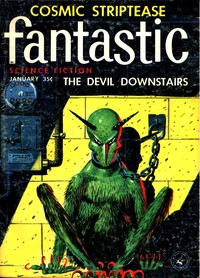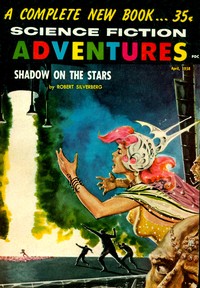A man who lived three lives? A piker! Jerry
Norcriss lived hundreds—all over the Galaxy!ZOOLOGY 2097
Trial-and-error familiarization with new life-forms is dangerously impractical on a far planet, where the representation of Earth men may be a solitary five-man crew. The loss of even a single man constitutes, in effect, obliteration of one-fifth of that planet's Earth-population. This is the "why" of the Space Zoologist.
He opened his eyes. Six eyes. In two rows of three eyes each.
He did not, however, see six images. The widespread belief in the multitudinous images seen by the faceted eyes of a housefly had been debunked the first time a helmeted biochemist had intruded upon that insect's puny brain. As with human eyes, the images were fused into a whole when they reached the mind. Save for the disconcerting sensation of possessing a horizontal and vertical peripheral vision of approximately three hundred degrees sight was comfortably normal.
.jpg)
.jpg)

.jpg)


.jpg)


.jpg)
.jpg)
.jpg)
.jpg)
.jpg)

.jpg)




.jpg)
.jpg)

.jpg)
.jpg)
.jpg)

.jpg)
.jpg)


